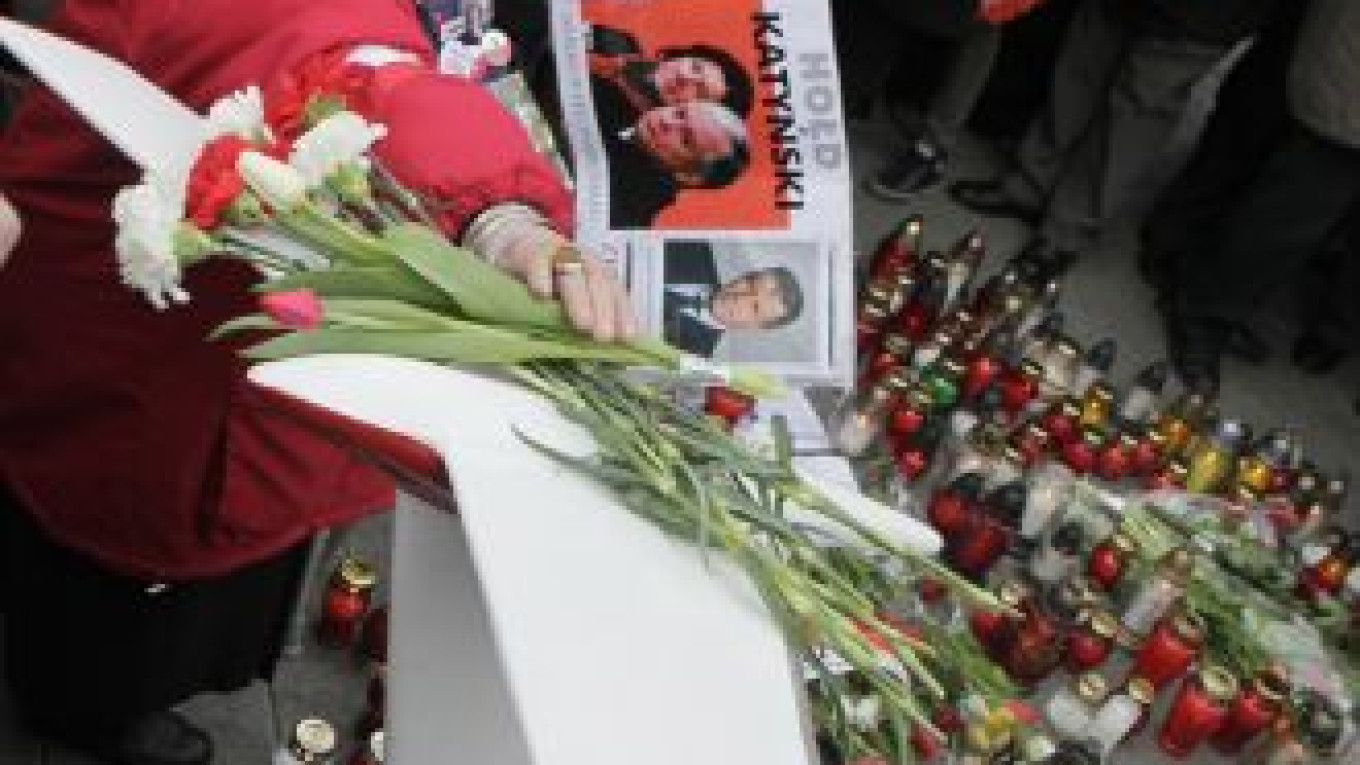WARSAW — Poles mourned on Sunday their former president and 95 others killed in a plane crash one year ago, but their commemoration was tarnished by political divisions and anger with Russia over the removal of a memorial plaque.
President Lech Kaczynski, his wife, Maria, and a sizeable chunk of Poland's military and political elite died on April 10, 2010, when their plane crashed in thick fog while trying to land in Smolensk.
Poland's worst disaster since World War II revived historic suspicions about Russia, its former Cold War master. It also deepened a rift between Prime Minister Donald Tusk's centrist government and the right-wing opposition party of Kaczynski's twin brother, Jaroslaw, who blamed Moscow and Tusk for the crash.
Kaczynski shunned Sunday's official commemorative ceremonies attended by Tusk and President Bronislaw Komorowski, instead going to a separate church service and performing his own wreath-laying ritual in front of the presidential palace.
Hundreds of supporters cheered Kaczynski, waved white and red Polish flags and shouted anti-government and anti-Russian slogans, branding Tusk a "traitor" for seeking better ties with Moscow. Some in the crowd scuffled with riot police.
Many Poles are angry that Russia's official report into the causes of the crash pins all the blame on the Polish pilots and absolves the Russian ground staff of any responsibility. A recent poll shows that a majority of Poles feel there has still not been an adequate explanation of what happened.
Kaczynski hopes the patriotic emotions unleashed by Sunday's anniversary will fire up his campaign for Poland's parliamentary elections, due in October. Tusk's pro-business, pro-EU Civic Platform is expected to win, but some opinion polls show Kaczynski's Law and Justice narrowing the gap.
Komorowski, a Tusk ally who defeated Kaczynski in last summer's presidential election, urged reconciliation among Poles.
"The most beautiful of all monuments that could be erected would be the monument of community and the recognition that we still have a great deal to do in memory of those who have gone on to their reward," he said at a ceremony in Warsaw's Powazki Cemetery, attended by top officials and families of the dead.
Last April, Lech Kaczynski's party had been heading to the Katyn forest near Smolensk to honor 22,000 Polish officers and intellectuals murdered by Soviet forces in 1940.
Komorowski will visit the Smolensk crash site and the Katyn memorial on Monday with President Dmitry Medvedev. He is expected to raise the issue of a memorial plaque that has further exacerbated Poles' sense of grievance against Russia.
A Polish-language plaque, erected at Smolensk by families of the crash victims, described how Kaczynski's party died while trying to mark the 70th anniversary of "the Soviet crime of genocide against prisoners of war, Polish army officers."
But Russian authorities replaced it on Saturday with a much shorter text, in both Russian and Polish, that omits all mention of the Katyn massacre and refers only to the plane crash.
"I am shocked [by the Russian move]. This incident has undermined Russian credibility," said Malgorzata Szmajdzinska, widow of a leading Polish politician who died in the crash.
Andrei Yevseyenko, a spokesman for Smolensk's governor, said Poland had previously agreed to the removal of the original sign and its replacement with a bilingual plaque. He said it was not necessary to mention Katyn on a plaque at the site of the crash.
The original Polish plaque will be transferred to a museum at Katyn dedicated specifically to the 1940 massacre, he said.
Polish media suggested Komorowski might not lay flowers at the site on Monday as a mark of protest, though his adviser said he expected a solution would be found.
"The Polish diplomats preparing the visit will manage to cope with this problem in such a way as not to wound Polish hearts," said Tomasz Nalecz, Komorowski's chief adviser. "I believe the presidents will discuss the incident sincerely in a good atmosphere and with good results."
A Message from The Moscow Times:
Dear readers,
We are facing unprecedented challenges. Russia's Prosecutor General's Office has designated The Moscow Times as an "undesirable" organization, criminalizing our work and putting our staff at risk of prosecution. This follows our earlier unjust labeling as a "foreign agent."
These actions are direct attempts to silence independent journalism in Russia. The authorities claim our work "discredits the decisions of the Russian leadership." We see things differently: we strive to provide accurate, unbiased reporting on Russia.
We, the journalists of The Moscow Times, refuse to be silenced. But to continue our work, we need your help.
Your support, no matter how small, makes a world of difference. If you can, please support us monthly starting from just $2. It's quick to set up, and every contribution makes a significant impact.
By supporting The Moscow Times, you're defending open, independent journalism in the face of repression. Thank you for standing with us.
Remind me later.


